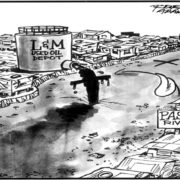WHEN justice is delayed, is justice denied?
This pithy aphorism seems to be fitting for relatives of some of the victims of the 2009 Maguindanao killings.
On June 24, activist lawyer Harry Roque reported that families of 14 Maguinadanao massacre victims, have agreed to monetary settlement and demanded P50 million from those charged in the gruesome killings.
“But no settlement has been reached to date: The ‘emissary,’ identified as Jun Chan, was killed in an ambush en route to his farm in Barangay Sulit in General Santos City a month after the agreement was signed,” Roque said in his blog, Harryroque.com.
“Under this scheme, the victims were to sign not just a waiver and quitclaim, but also an affidavit pinning the blame for the massacre to Governor Toto Mangundadatu.“Unless the Philippine government complies with its duty to pay compensation, the victims will continuously be tempted with schemes that may eventually cause a miscarriage of justice,” Roque added.
Who could ever forget that fateful day on November 23, 2009, when a private army (allegedly led by the Ampatuan clan) massacred a 58-person convoy, who were on their way to file the certificate of candidacy of then Buluan vice mayor Esmael “Toto” Mangudadatu.
It was tagged as one of the most heinous political crimes in history and made headlines in international media.
32 of the victims were media practitioners — making it the single worst act of extrajudicial killing, reiterating that the Philippines is indeed a dangerous country for journalists.
Maguindanao Provincial Gov. Esmael Mangudadatu, who lost his wife and other relatives in the massacre, vowed to continue his search for justice and put the perpetrators behind bars.
“I have not lost hope. We will continue seeking justice,” Mangudadatu told Inquirer.net.
Meanwhile, Justice Secretary Leila De Lima urged families of the victims “to resist temptations for monetary settlement from the accused Ampatuan family.”
“I fully understand the impatience and/or restlessness on the part of the victims’ families vis-a-vis the pace of the trial. But they know that, while “slow,” the proceedings continue to move and progress. They should resist temptations for monetary settlement from the accused,” De Lima said.
De Lima echoed President Benigo Aquino’s marching order for a swift resolution of the 2009 Maguinadanao massace. The government has earlier directed state prosecutors to oppose any dilatory tactics and vowed to have convictions, particularly on the principal accused, by 2016 before President Aquino steps down.
“The Supreme Court and the Executive branch are one in the recognition that this case must proceed in a manner that is acceptable to all concerned, especially to the victims of the Maguindanao massacre,” Presidential spokesperson Edwin Lacierda said, following Roque’s earlier claims.
“It’s the trial of the century and so it is in our interest as well that we see this case prosecuted to its full end,” Lacierda added.
After four years, almost 200 people have been implicated in the massacre, topped by member of the Ampatuan clan. Some have been arrested, others were arraigned.
But for the victims’ families, justice remains elusive. The outcome of the Maguinadanao massacre trials will dictate whether the Philippines has learned its lesson.
Will this put an end to violence and impunity? Or are we condemned to repeat the same mistakes all over again?
(AJPress)





